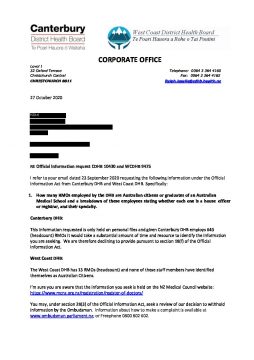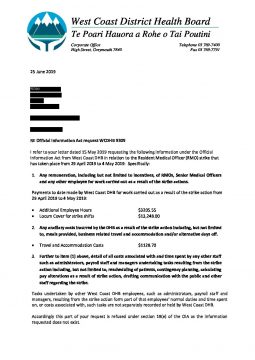RE Official Information Act request WCDHB 9309
I refer to your letter dated 15 May 2019 requesting the following information under the Official Information Act from West Coast DHB in relation to the Resident Medical Officer (RMO) strike that has taken place from 29 April 2019 to 4 May 2019: Specifically:
1. Any remuneration, including but not limited to incentives, of RMOs, Senior Medical Officers and any other employee for work carried out as a result of the strike actions.
Payments to date made by West Coast DHB for work carried out as a result of the strike action from 29 April 2019 to 4 May 2019
2. Any ancillary costs incurred by the DHB as a result of the strike action including, but not limited to, meals provided, business related travel and accommodation and/or alternative days off.
3. Further to item (1) above, detail of all costs associated with and time spent by any other staff such as administrators, payroll staff and managers undertaking tasks resulting from the strike action including, but not limited to, rescheduling of patients, contingency planning, calculating pay alterations as a result of strike action, drafting communication with the public and other staff regarding the strike.
Tags 2019Official Information Act request responseOfficial Information Act responseOIAOIA request responseoia responseremunerationRMOsSMOsstrike action
More informationDownload pdf (647 KB)


